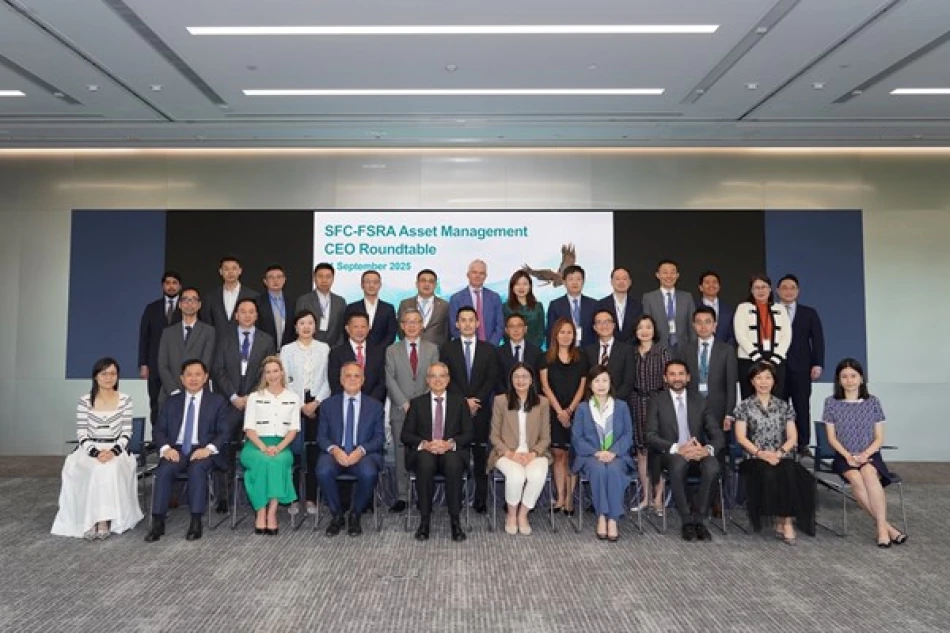
Abu Dhabi Global Market and Hong Kong Securities Exchange Explore Asset Management Opportunities
Abu Dhabi and Hong Kong Forge Strategic Partnership to Unlock Cross-Border Investment Flows
Abu Dhabi Global Market (ADGM) and Hong Kong's Securities and Futures Commission are deepening their regulatory collaboration to create new pathways for asset managers, signaling the UAE's growing ambitions to capture Asian capital flows and position itself as the Middle East's premier financial hub. The partnership leverages mutual fund licensing recognition systems that could reshape regional investment patterns.
High-Level Dialogue Targets Asian Capital
The Abu Dhabi Global Market Financial Services Regulatory Authority and Hong Kong's Securities and Futures Commission hosted a strategic dialogue in Hong Kong, bringing together over 20 senior executives from Hong Kong-based asset management firms. The session was led by Julia Leung, CEO of Hong Kong's Securities and Futures Commission, and Emmanuel Givanakis, CEO of ADGM's Financial Services Regulatory Authority.
The discussions centered on opportunities for Hong Kong asset managers to access UAE investors through ADGM's regulatory framework and the broader UAE market via the country's mutual fund licensing recognition system. This represents a significant step in the UAE's strategy to attract international capital and diversify its financial ecosystem beyond traditional oil-dependent sectors.
Building on Established Regulatory Foundations
The dialogue builds upon a memorandum of understanding signed in May between the two regulatory bodies, demonstrating sustained commitment to cross-border financial integration. This framework approach mirrors successful regulatory partnerships seen between Singapore and other major financial centers, where mutual recognition agreements have facilitated billions in cross-border investment flows.
Christina Choi, Executive Director of Investment Products at Hong Kong's SFC, and Philip Richard, Executive Director of International Affairs at ADGM's regulatory authority, participated in detailed technical discussions about implementation mechanisms.
Strategic Implications for Regional Finance
UAE's Financial Hub Ambitions
The partnership reflects the UAE's broader strategy to establish itself as a bridge between East and West, competing directly with established centers like Singapore and Dubai International Financial Centre. By creating streamlined access for Hong Kong managers, ADGM is positioning itself to capture a share of Asia's massive asset management industry, which oversees trillions in regional wealth.
Market Access and Investment Flows
For Hong Kong asset managers, the arrangement offers direct access to the UAE's rapidly growing investor base and serves as a potential gateway to broader Middle Eastern and African markets. This is particularly valuable as Hong Kong managers seek to diversify their client base amid evolving geopolitical dynamics affecting traditional Western markets.
The mutual recognition system eliminates regulatory duplication and reduces compliance costs, making cross-border fund distribution more economically viable for mid-sized managers who previously found international expansion prohibitively expensive.
Technical Implementation and Market Impact
A specialized seminar attended by over 30 representatives from Hong Kong's asset management sector provided detailed guidance on regulatory requirements for cross-border fund distribution. This technical focus suggests both regulators are moving beyond symbolic cooperation toward practical implementation.
Givanakis emphasized ADGM's commitment to fostering innovation and enhancing investor confidence, stating that the partnership would drive sustainable growth while reinforcing ADGM's position as the region's leading asset management center. This positioning directly challenges other regional hubs and signals intensifying competition for international financial services business.
The initiative represents a calculated bet that regulatory harmonization and mutual recognition will become increasingly important as global capital flows face new restrictions and compliance requirements. By establishing these frameworks now, both jurisdictions are preparing for a future where seamless cross-border investment capabilities provide competitive advantages in attracting international business.
Most Viewed News

 Layla Al Mansoori
Layla Al Mansoori






